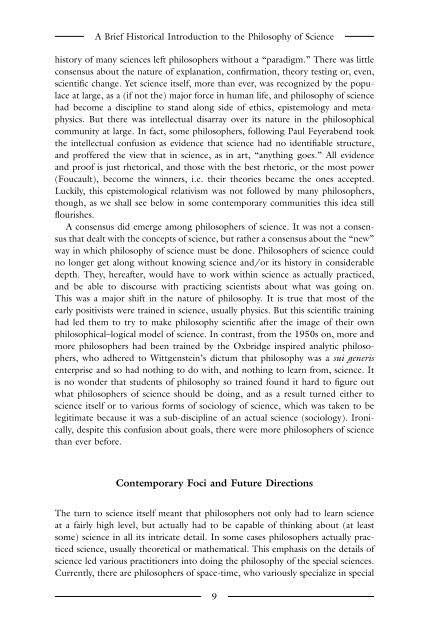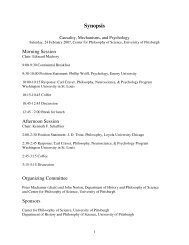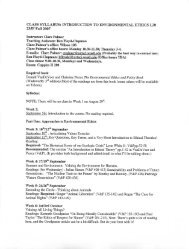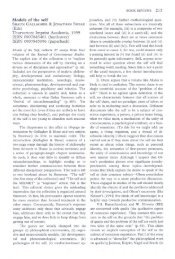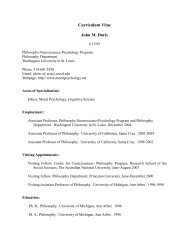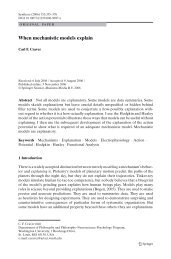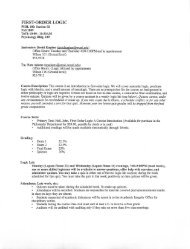The Blackwell Guide to the Philosophy of Science - The Department ...
The Blackwell Guide to the Philosophy of Science - The Department ...
The Blackwell Guide to the Philosophy of Science - The Department ...
You also want an ePaper? Increase the reach of your titles
YUMPU automatically turns print PDFs into web optimized ePapers that Google loves.
A Brief His<strong>to</strong>rical Introduction <strong>to</strong> <strong>the</strong> <strong>Philosophy</strong> <strong>of</strong> <strong>Science</strong><br />
his<strong>to</strong>ry <strong>of</strong> many sciences left philosophers without a “paradigm.” <strong>The</strong>re was little<br />
consensus about <strong>the</strong> nature <strong>of</strong> explanation, confirmation, <strong>the</strong>ory testing or, even,<br />
scientific change. Yet science itself, more than ever, was recognized by <strong>the</strong> populace<br />
at large, as a (if not <strong>the</strong>) major force in human life, and philosophy <strong>of</strong> science<br />
had become a discipline <strong>to</strong> stand along side <strong>of</strong> ethics, epistemology and metaphysics.<br />
But <strong>the</strong>re was intellectual disarray over its nature in <strong>the</strong> philosophical<br />
community at large. In fact, some philosophers, following Paul Feyerabend <strong>to</strong>ok<br />
<strong>the</strong> intellectual confusion as evidence that science had no identifiable structure,<br />
and pr<strong>of</strong>fered <strong>the</strong> view that in science, as in art, “anything goes.” All evidence<br />
and pro<strong>of</strong> is just rhe<strong>to</strong>rical, and those with <strong>the</strong> best rhe<strong>to</strong>ric, or <strong>the</strong> most power<br />
(Foucault), become <strong>the</strong> winners, i.e. <strong>the</strong>ir <strong>the</strong>ories became <strong>the</strong> ones accepted.<br />
Luckily, this epistemological relativism was not followed by many philosophers,<br />
though, as we shall see below in some contemporary communities this idea still<br />
flourishes.<br />
A consensus did emerge among philosophers <strong>of</strong> science. It was not a consensus<br />
that dealt with <strong>the</strong> concepts <strong>of</strong> science, but ra<strong>the</strong>r a consensus about <strong>the</strong> “new”<br />
way in which philosophy <strong>of</strong> science must be done. Philosophers <strong>of</strong> science could<br />
no longer get along without knowing science and/or its his<strong>to</strong>ry in considerable<br />
depth. <strong>The</strong>y, hereafter, would have <strong>to</strong> work within science as actually practiced,<br />
and be able <strong>to</strong> discourse with practicing scientists about what was going on.<br />
This was a major shift in <strong>the</strong> nature <strong>of</strong> philosophy. It is true that most <strong>of</strong> <strong>the</strong><br />
early positivists were trained in science, usually physics. But this scientific training<br />
had led <strong>the</strong>m <strong>to</strong> try <strong>to</strong> make philosophy scientific after <strong>the</strong> image <strong>of</strong> <strong>the</strong>ir own<br />
philosophical–logical model <strong>of</strong> science. In contrast, from <strong>the</strong> 1950s on, more and<br />
more philosophers had been trained by <strong>the</strong> Oxbridge inspired analytic philosophers,<br />
who adhered <strong>to</strong> Wittgenstein’s dictum that philosophy was a sui generis<br />
enterprise and so had nothing <strong>to</strong> do with, and nothing <strong>to</strong> learn from, science. It<br />
is no wonder that students <strong>of</strong> philosophy so trained found it hard <strong>to</strong> figure out<br />
what philosophers <strong>of</strong> science should be doing, and as a result turned ei<strong>the</strong>r <strong>to</strong><br />
science itself or <strong>to</strong> various forms <strong>of</strong> sociology <strong>of</strong> science, which was taken <strong>to</strong> be<br />
legitimate because it was a sub-discipline <strong>of</strong> an actual science (sociology). Ironically,<br />
despite this confusion about goals, <strong>the</strong>re were more philosophers <strong>of</strong> science<br />
than ever before.<br />
Contemporary Foci and Future Directions<br />
<strong>The</strong> turn <strong>to</strong> science itself meant that philosophers not only had <strong>to</strong> learn science<br />
at a fairly high level, but actually had <strong>to</strong> be capable <strong>of</strong> thinking about (at least<br />
some) science in all its intricate detail. In some cases philosophers actually practiced<br />
science, usually <strong>the</strong>oretical or ma<strong>the</strong>matical. This emphasis on <strong>the</strong> details <strong>of</strong><br />
science led various practitioners in<strong>to</strong> doing <strong>the</strong> philosophy <strong>of</strong> <strong>the</strong> special sciences.<br />
Currently, <strong>the</strong>re are philosophers <strong>of</strong> space-time, who variously specialize in special<br />
9


